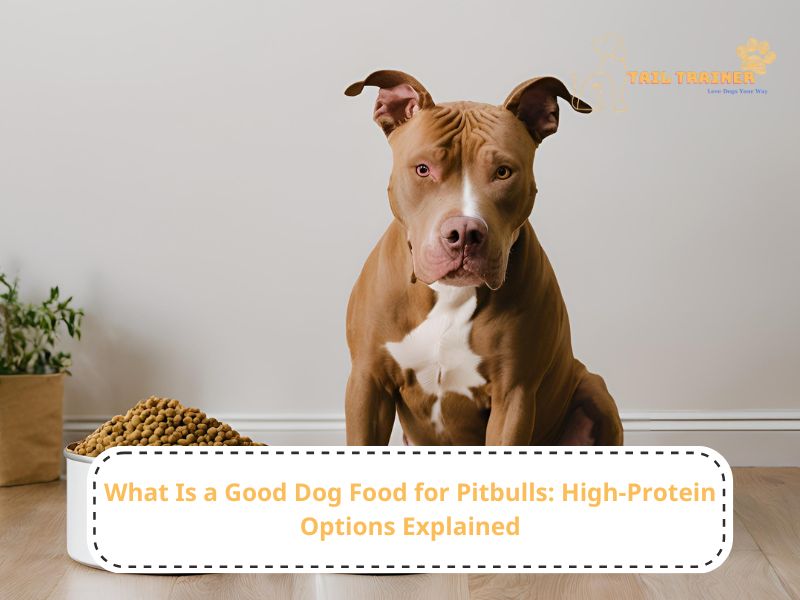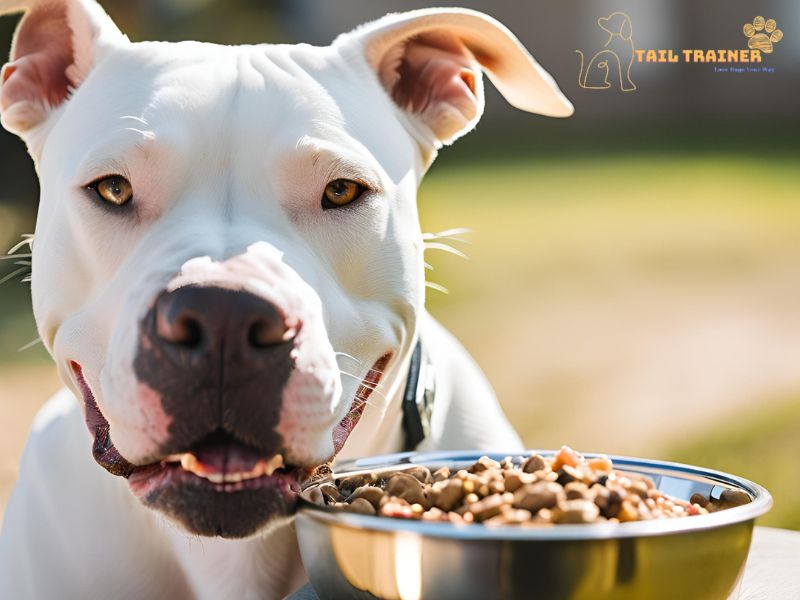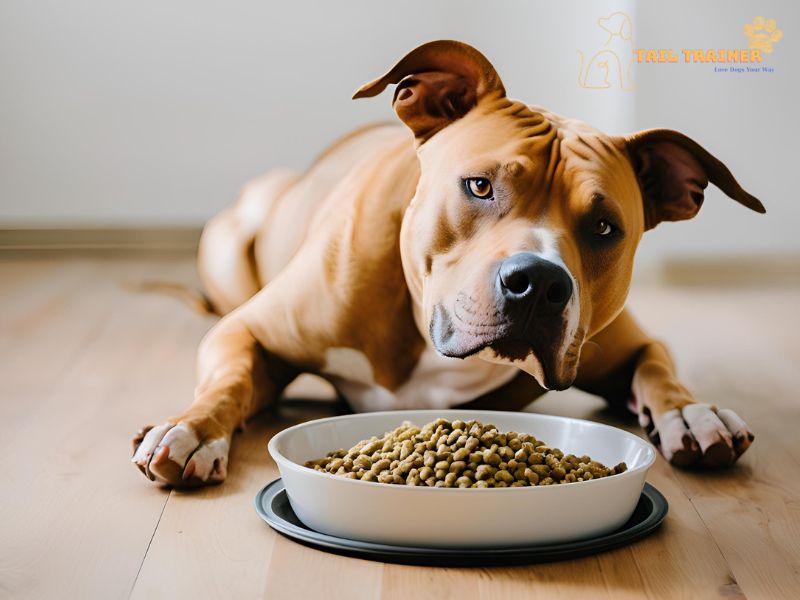Looking for the best food options for your Pitbull? A good diet plays a critical role in maintaining their health, energy, and muscle development. The right dog food for Pitbulls should offer high protein, balanced nutrients, and ingredients that support their robust nature. Visit Tail Trainer regularly for more guides and tips!
Key Takeaways
Good dog food for Pitbulls is rich in protein, contains quality fat sources, and includes essential nutrients like vitamins, minerals, and omega-3 fatty acids. Opt for foods made with real meat, avoid fillers, and consider any allergies or sensitivities. Consult your vet for personalized advice.
Understanding the Nutritional Needs of Pitbulls

Pitbulls are known for their muscular build, high energy, and strong physique, making their dietary needs distinct. These dogs require a diet that supports muscle growth, maintains energy levels, and keeps their immune system strong.
Why Protein Matters for Pitbulls
Protein is essential for Pitbulls because it aids in muscle development and repair. A high-protein diet ensures they have enough fuel to stay active while maintaining lean muscle mass. Aim for dog food with at least 30% protein content derived from real meat sources like chicken, beef, or fish.
The Role of Animal-Based Protein
Animal-based protein is more digestible and bioavailable compared to plant-based options. It provides the necessary amino acids that Pitbulls need for optimal health. Look for dog foods that list meat as the first ingredient, as this indicates a higher concentration of quality protein.
Fats and Carbohydrates in Pitbull Nutrition
Fats are another crucial component of a Pitbull’s diet. They not only supply energy but also support skin and coat health. Healthy fats like omega-3 fatty acids from sources like salmon oil or flaxseed oil are highly beneficial.
Carbohydrates provide additional energy and support digestion. While Pitbulls thrive on low to moderate carbs, choose complex carbs like sweet potatoes, brown rice, or peas for sustained energy release.
Factors to Consider When Choosing Dog Food for Pitbulls

Selecting the right dog food involves considering several factors that contribute to your dog’s overall well-being. Here are the key elements to look at:
Food Allergies and Sensitivities
Many Pitbulls are prone to food allergies, which can manifest as itchy skin, digestive upset, or ear infections. Common allergens include corn, soy, and wheat. If your Pitbull shows signs of food allergies, consider switching to a grain-free or limited ingredient diet (LID) to identify and eliminate problem ingredients.
Grain-Free vs. Limited Ingredient Diets
- Grain-Free Diets: Exclude grains and focus on protein sources, making them suitable for dogs with grain sensitivities.
- Limited Ingredient Diets: Feature fewer ingredients, making it easier to identify and manage allergies.
Age-Appropriate Nutrition
Pitbulls’ dietary needs change as they age. Puppy food for Pitbulls is designed to support their rapid growth, while adult formulas maintain their weight and muscle mass. Senior Pitbulls, on the other hand, need lower-calorie diets to prevent obesity while still getting the right nutrients.
- Puppies: High protein, higher fat, more calories
- Adults: Moderate protein, balanced fat, stable calories
- Seniors: Lower fat, controlled calories, joint support supplements
Top Ingredients in Good Dog Food for Pitbulls

The best dog food for Pitbulls should have a balanced mix of proteins, fats, vitamins, and minerals. Here’s what you should look for:
Real Meat as the Primary Ingredient
The top ingredient in your dog’s food should be real meat, which offers quality protein and is easier for Pitbulls to digest. Options like chicken, beef, lamb, or fish are highly recommended.
Healthy Fat Sources
Good sources of fat include salmon oil, chicken fat, and flaxseed oil. These fats not only keep the coat shiny but also support brain development and reduce inflammation.
Whole Grains or Grain Alternatives
If your Pitbull can tolerate grains, consider whole grains like brown rice or oats. If grains are an issue, opt for alternatives like peas, lentils, or sweet potatoes, which offer a low glycemic index.
Recommended Brands for Pitbull Nutrition
Selecting the right brand for your Pitbull can be overwhelming with so many options on the market. Here are a few brands that cater specifically to the nutritional needs of muscular breeds like Pitbulls:
Taste of the Wild
Known for its high protein content and grain-free options, Taste of the Wild offers formulas with ingredients like venison, salmon, and lamb, making it a top choice for active Pitbulls. It includes fruits and vegetables for antioxidants, supporting overall health.
Blue Buffalo Wilderness
Blue Buffalo Wilderness provides protein-rich, grain-free formulas made with real meat. It includes LifeSource Bits, which are a blend of vitamins, minerals, and antioxidants designed to enhance the immune system.
Wellness CORE
Wellness CORE offers grain-free, high-protein diets tailored for breeds like Pitbulls. Their recipes include chicken, turkey, or salmon as primary ingredients, ensuring muscle support and optimal energy levels.
Transitioning Your Pitbull to New Dog Food
Switching dog food requires a gradual approach to avoid upsetting your dog’s digestive system. Start by mixing 25% of the new food with 75% of the old food, then gradually increase the new food over 7–10 days.
Tips for a Smooth Transition
- Introduce the new food slowly to prevent stomach upset.
- Monitor your dog’s stool and overall behavior during the transition.
- Consult your veterinarian if you notice any digestive issues or allergic reactions.
Frequently Asked Questions
What is the best dog food for Pitbulls with allergies?
For Pitbulls with allergies, limited ingredient diets or grain-free foods are ideal. Look for recipes that include novel protein sources like duck or bison, as they are less likely to trigger allergies.
How much should I feed my Pitbull?
The amount varies based on age, weight, and activity level. Generally, adult Pitbulls should consume 2–3 cups of food per day, divided into two meals. Always refer to the feeding guide on the dog food packaging.
Is raw food good for Pitbulls?
Yes, raw food diets can be beneficial as they offer natural proteins and fats, promoting muscle growth and energy. However, consult your vet before switching to a raw food diet to ensure it meets all nutritional needs.
Are grain-free diets better for Pitbulls?
Grain-free diets can benefit Pitbulls with grain allergies or sensitivities. However, for Pitbulls without allergies, whole grains like brown rice and oats provide valuable nutrients.
Can I add supplements to my Pitbull’s diet?
Yes, supplements like fish oil for omega-3 fatty acids, glucosamine for joint health, and probiotics for digestion can enhance your Pitbull’s diet. Always consult your vet before adding any new supplements.
For more dog training tips and nutritional advice, check back often at Tail Trainer! Keeping your Pitbull happy, healthy, and strong starts with the right diet and consistent training.
